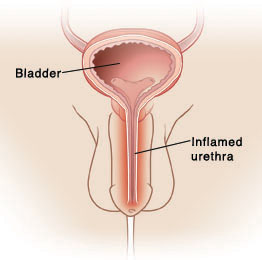The urethra is the tube that runs from the bladder through the penis. When the urethra is inflamed, it is called urethritis. The urethra becomes swollen and causes a burning feeling or pain when you pee (urinate). Other symptoms of urethritis may include itching or tingling of the penis, or pus discharge from the penis. You may also have pain with sex and masturbation. Some people may not have symptoms.
What causes urethritis?
Urethritis can be caused by a bacterial or viral infection. Such an infection can lead to conditions, such as a urinary tract infection (UTI) or sexually transmitted infections (STIs). Urethritis can also be caused by injury or sensitivity or allergy to chemicals in lotions and other products.
How is urethritis diagnosed?
Your healthcare provider will examine you and ask about your symptoms and health history. You may also have 1 or more of these tests:
-
Urine test. This is done to take pee samples and have them checked for problems.
-
Blood test. A blood sample is taken and checked for problems.
-
Urethral discharge culture. A fluid sample is taken from inside the urethra and checked under a microscope. To get the sample, a cotton swab is inserted into the opening of the penis and into the urethra.
-
Cystoscopy. This test lets the healthcare provider look for problems in the urinary tract. The test uses a thin, flexible tube (cystoscope). It has a light and camera attached. The scope is inserted into the urethra.
How is urethritis treated?
Treatment depends on the cause of urethritis. If it’s from a bacterial infection, medicines that fight infection (antibiotics) will be given. Your healthcare provider can tell you more about your treatment choices. In the meantime, your symptoms can be treated. To ease pain and swelling, anti-inflammatory medicines, such as ibuprofen, may be given. If not treated, symptoms may get worse. Also scar tissue can form in the urethra, causing it to narrow.
When to call your healthcare provider
Call your healthcare provider right away if any of these occur:
-
Fever of
100.4 ° F (38 °C ) or higher, or as advised by your provider -
Blood in your pee or semen
-
Burning feeling or pain when you pee
-
Increased urge to pee
-
Discharge from the penis
-
Itching, soreness, or swelling in the penis or groin
-
Pain during sex or masturbation
-
Inability to pee
Preventing STIs
When it comes to sex, it’s important to take care and be safe. Any sexual contact with the penis, vagina, anus, or mouth can spread an STI. The only sure way to prevent STIs is not having sex. But there are ways to make sex safer. Use a latex condom each time you have sex. And talk with your partner about STIs before you have sex.


